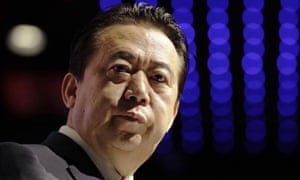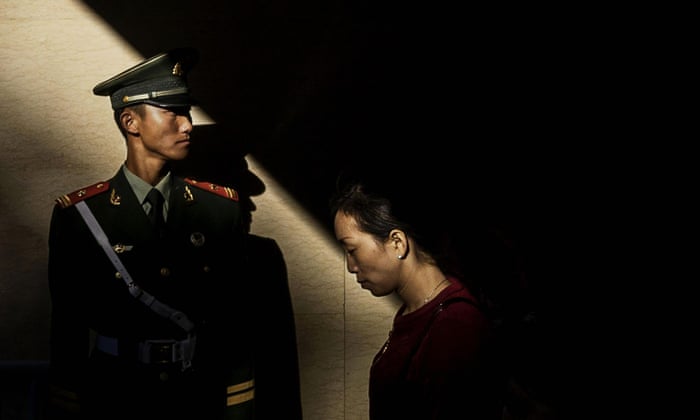By Lily Kuo in Beijing

Meng Hongwei appears to be the latest target of the Chinese ruling Communist party’s controversial anti-corruption campaign.
The bizarre case of the former Interpol president Meng Hongwei, now detained and under investigation in China, has raised concerns about the country’s expanded anti-corruption drive.
Meng, a senior Chinese security official, appears to be the latest target in a far-reaching anti-graft campaign that critics say is a cover for eliminating political figures disloyal to Chinese dictator Xi Jinping.
The bizarre case of the former Interpol president Meng Hongwei, now detained and under investigation in China, has raised concerns about the country’s expanded anti-corruption drive.
Meng, a senior Chinese security official, appears to be the latest target in a far-reaching anti-graft campaign that critics say is a cover for eliminating political figures disloyal to Chinese dictator Xi Jinping.
On Monday, days after Meng was reported missing by his wife, Chinese authorities accused him of bribery in a lengthy statement stressing the importance of the country’s “anti-corruption struggle” and the need for “absolute loyal political character”.
On Sunday, authorities said Meng was in the custody of the National Supervisory Commission (NSC), China’s new super-agency charged with investigating corruption throughout the government, which is overseeing his case.
Human rights advocates say Meng is likely being held in liuzhi or “retention in custody” – a form of detention used by the NSC that denies detainees access to legal counsel or families for as long as six months.
Liuzhi is meant to be an improvement on the previous shuanggui system, a disciplinary process within the ruling Chinese Communist party known for the use of torture and other abuses.
Human rights advocates say Meng is likely being held in liuzhi or “retention in custody” – a form of detention used by the NSC that denies detainees access to legal counsel or families for as long as six months.
Liuzhi is meant to be an improvement on the previous shuanggui system, a disciplinary process within the ruling Chinese Communist party known for the use of torture and other abuses.
Under liuzhi, family members are supposed to be notified.
Rights advocates say there are few indications liuzhi will be much better.
Rights advocates say there are few indications liuzhi will be much better.
The Chinese journalist Chen Jieren, who had accused a party official in Hunan province of corruption, has been detained since July by the NSC and denied access to his lawyer, according to Radio Free Asia.
In May, the driver of a low-ranking official in Fujian province died during interrogation after almost a month in liuzhi.
In May, the driver of a low-ranking official in Fujian province died during interrogation after almost a month in liuzhi.
When family members saw his body, his face was disfigured.
“Liuzhi ’is a very new system, but we can speculate pretty clearly [about] the kind of treatment people are subjected to,” says Michael Caster, a human rights advocate with Safeguard Defenders, a human rights NGO in Asia.
“Liuzhi ’is a very new system, but we can speculate pretty clearly [about] the kind of treatment people are subjected to,” says Michael Caster, a human rights advocate with Safeguard Defenders, a human rights NGO in Asia.
“Prolonged sleep deprivation, forced malnourishment, stress positions, beatings, psychological abuse, threats to family members certainly, oftentimes leading to forced confessions.”
Meng’s case is the most high-profile yet for the NSC, which was created in March to expand China’s anti-corruption drive to people and entities outside the Communist party, including government ministries, state-owned companies, and people working in the public sector.
“Since its inauguration, however, the NSC has not nabbed any big ‘tigers’, so to speak,” said Dimitar Gueorguiev, assistant professor of political science at Syracuse University, where he focuses on Chinese governance.
Meng’s case is the most high-profile yet for the NSC, which was created in March to expand China’s anti-corruption drive to people and entities outside the Communist party, including government ministries, state-owned companies, and people working in the public sector.
“Since its inauguration, however, the NSC has not nabbed any big ‘tigers’, so to speak,” said Dimitar Gueorguiev, assistant professor of political science at Syracuse University, where he focuses on Chinese governance.
“Meng’s arrest seems like a powerful demonstration of China’s commitment to rooting out corruption, even when it can cost them the directorship of an important international vehicle,” he said.
Speculation for the reasons behind Meng’s swift downfall ranges from his access to sensitive information after a long career at the public security ministry to his tenure at Interpol, when the organisation revoked an international alert for Dolkun Isa, the president of the Munich-based World Uyghur Congress, which is critical of China’s treatment of ethnic Uighurs in East Turkestan.
Speculation for the reasons behind Meng’s swift downfall ranges from his access to sensitive information after a long career at the public security ministry to his tenure at Interpol, when the organisation revoked an international alert for Dolkun Isa, the president of the Munich-based World Uyghur Congress, which is critical of China’s treatment of ethnic Uighurs in East Turkestan.
While Meng’s exact whereabouts are still unclear, rights activists say his fate is not.
“The formula is simple,” says Maya Wang, a senior China researcher for Human Rights Watch. “Like others forcibly disappeared before him, including human rights activists mistreated in custody by Meng’s public security ministry, he faces detention until he confesses under duress, an unfair trial, and then harsh imprisonment, possibly for many years.”
“The formula is simple,” says Maya Wang, a senior China researcher for Human Rights Watch. “Like others forcibly disappeared before him, including human rights activists mistreated in custody by Meng’s public security ministry, he faces detention until he confesses under duress, an unfair trial, and then harsh imprisonment, possibly for many years.”
